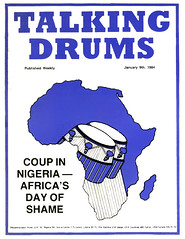Comment - Africa's Day of Shame
In the heady atmosphere that surrounds such events and in the attempt to justify the coup, the temptation is always very great to condemn everything and everybody that represented civilian constitutional rule.
It is even more tempting for all those who want to curry favour with the new authorities in Nigeria to go out of their way to prove their loyalty by denouncing the toppled government. Those Nigerians who hold jobs that they want to keep would be imagining that the way to keep their jobs is to put as much distance as possible between themselves and the past government, and those who have had their eyes on positions that had been unattainable will be wanting to demonstrate how very much they had disapproved of and fought against the "disgraced Shagari government".
Nobody will want to remember in a hurry that the entire country had been united in the desire to give constitutional rule a chance to work in Nigeria.
The problems had been many, of course, complicated no doubt by the fact that 13 years of military rule earlier on meant that there were many new grounds for the civilians to tread. But then gradually everybody was beginning to learn, the elected officials too what many people considered far too long a time to master their new roles, but Senate committee hearings were becoming much more than formalities and the fact that they were opened to the public meant that the average citizen could see and judge for himself how government was functioning.
The Nigerian Press had also come into its own and could justifiably be called the fourth estate of the state as the various newspapers, radio and television stations gave their readers and listeners news and comments from all possible angles and perspectives. There were never any shortages of critics both inside and outside the Press.
As all those who have been fast in not recalling any pluses of the Shagari administration will surely discover soon, tolerance has never been a strong characteristic of military regimes. The furious debates, the emotional arguments and the criticisms that have formed the attraction in Nigeria are not likely to have the same full rein as before.
Customers who have had to put up with high prices will enjoy the bonanza brought on by armed soldiers forcing down prices, the joy normally does not last very long, and those same people might not be very happy when they are themselves the vicitms of military zeal.
Litigations are irritating when you are in a hurry and President Shagari might have moved faster if he could have announced as General Buhari has done that he has no time for litigations, but then the joys of the democratic process mean that there should be room for all, including those who would litigate.
There is a certain amount of arrogance involved in the action of General Buhari and his friends in taking up arms against the elected representatives of Nigerians and arrogating to themselves the right to decide how to judge their performance. They might care to ponder on what remedies there might be for their compatriots if they should decide that they are unimpressed by the performance of the Supreme Military Council.
It will be a measure of how committed the leaders of the other political parties, apart from the ruling NPN. were to the democratic process, if they also welcome the coup as many Nigerians are reported to have done. What should be clear is that it is not only Alhaji Shehu Shagari who has been indicted, it is the entire system and all those who claim to believe in the system, stand equally indicted.
Dr Namdi Azikiwe, Chief Obafemi Awolowo, the two elder statesmen of Nigerian politics and presidential candidates in the recent elections, might want to consider that there but for the grace of God would be them today in the handcuffs reported to be on Alhaji Shagari.
Nigeria has already passed through the most traumatic experience that any nation can expect to go through in fighting three years of a bloody civil war. That is enough suffering for any nation, and many Nigerians had always felt, and said, that having been through that dreadful experience, everybody's concern will be to ensure stability.
Unless, of course, the suggestion is being made that Nigeria's problems can only be solved by men in uniforms then it is ridiculous to say that the answer to the country's current problems need military intervention.
There is no guarantee that once the military solve all the problems - corruption, ineptitude, economic crisis - and pack themselves off to the barracks, an incoming civilian administration would not be susceptible to the same faults again. The vicious circle of military rule, and if the soldiers are to be believed, the ending of corruption, sound economic policies, progress and growth, to be followed by civilian constitutional rule and corruption and economic crisis and military rule again will continue forever.
Countries only learn through experience and acquiring that experience can only happen if elected officials are allowed to make mistakes and are voted out of power by their people.
Political instability is the surest way of evoking those dreadful memories. For one brief moment. Nigeria seemed to hold out the hope to the rest of the African continent that Africans can also make the democratic system work.
It is sad that the hope has been destroyed without any resistance.
